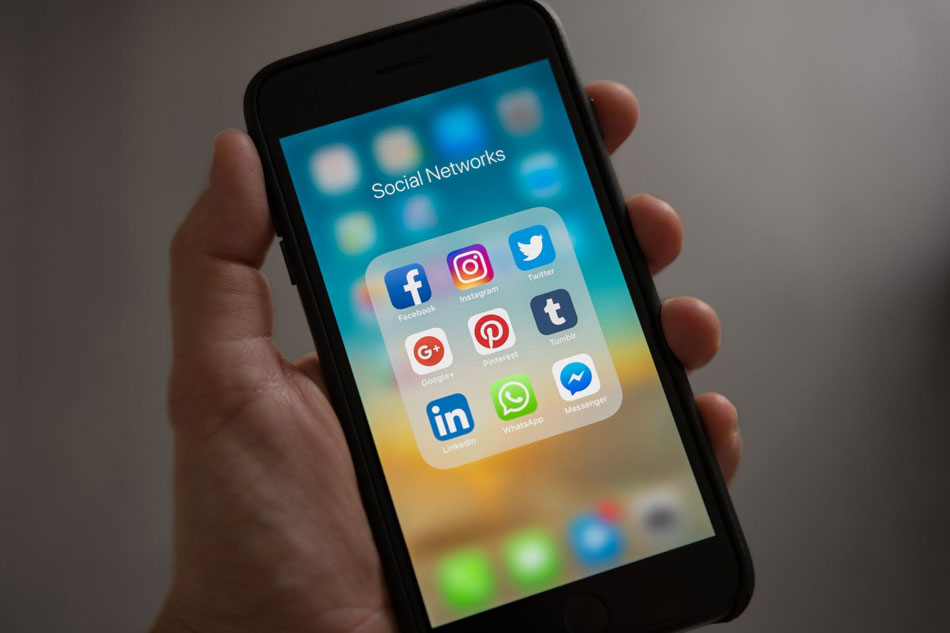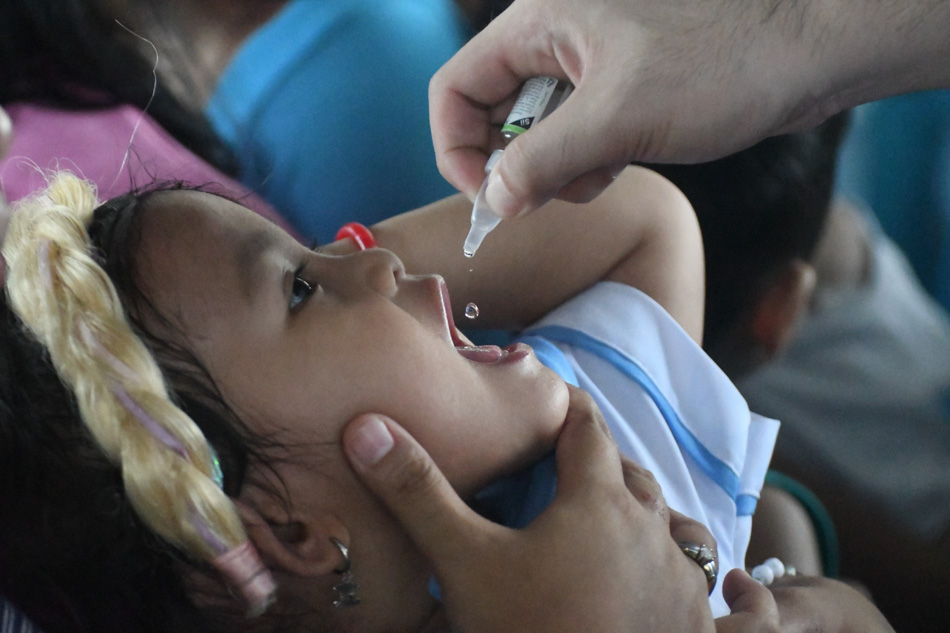Social media as a health threat: Misinformation leads to poor vaccine coverage, measles and polio resurgence | ABS-CBN
ADVERTISEMENT

Welcome, Kapamilya! We use cookies to improve your browsing experience. Continuing to use this site means you agree to our use of cookies. Tell me more!
Social media as a health threat: Misinformation leads to poor vaccine coverage, measles and polio resurgence
Jaehwa Bernardo,
ABS-CBN News
Published Dec 31, 2019 08:44 PM PHT
While social media brought more families and friends together despite the distance, it also paved the way to the spread of misinformation, leading to several health crises in the Philippines.
While social media brought more families and friends together despite the distance, it also paved the way to the spread of misinformation, leading to several health crises in the Philippines.
Anti-vaccine groups have exploited social media to spread false information on vaccines, effectively stoking fears among parents, who have become hesitant to have their children immunized.
Anti-vaccine groups have exploited social media to spread false information on vaccines, effectively stoking fears among parents, who have become hesitant to have their children immunized.
This year, for instance, the Philippines was hit by several outbreaks following a drop in immunization coverage due to the public’s distrust in vaccines, which Health Undersecretary Rolando Enrique “Eric” Domingo partly blamed on the proliferation of false information online.
This year, for instance, the Philippines was hit by several outbreaks following a drop in immunization coverage due to the public’s distrust in vaccines, which Health Undersecretary Rolando Enrique “Eric” Domingo partly blamed on the proliferation of false information online.
These false articles and studies linked vaccination to disorders such as autism, diseases, and even death.
These false articles and studies linked vaccination to disorders such as autism, diseases, and even death.
ADVERTISEMENT
“Of course, a lot of our kababayans have access to social media. So kapag nagkakaroon ng ganitong mga false information, nagi-instill ng fears, nakakadagdag talaga ito doon sa problem natin kaya bumaba ang ating coverage ng vaccination,” he said in an interview.
“Of course, a lot of our kababayans have access to social media. So kapag nagkakaroon ng ganitong mga false information, nagi-instill ng fears, nakakadagdag talaga ito doon sa problem natin kaya bumaba ang ating coverage ng vaccination,” he said in an interview.
(Some of our countrymen have access to social media. When they see false information, this instills fears, and adds up to our problems in combating low vaccine coverage.)
(Some of our countrymen have access to social media. When they see false information, this instills fears, and adds up to our problems in combating low vaccine coverage.)
DENGVAXIA CONTROVERSY
The country has seen a decrease in immunization coverage in recent years but it further dropped in 2018 due to the controversy around the anti-dengue vaccine Dengvaxia, according to Domingo.
The country has seen a decrease in immunization coverage in recent years but it further dropped in 2018 due to the controversy around the anti-dengue vaccine Dengvaxia, according to Domingo.
From at least 70 percent in the last few years, immunization coverage in 2018 slid to 40 percent.
From at least 70 percent in the last few years, immunization coverage in 2018 slid to 40 percent.
“Very loud 'yong ating naririnig na noise at saka very prolific 'yong makikita natin sa social media na reports ng association ng Dengvaxia sa death of children,” he said.
“Very loud 'yong ating naririnig na noise at saka very prolific 'yong makikita natin sa social media na reports ng association ng Dengvaxia sa death of children,” he said.
ADVERTISEMENT
Globally, vaccine confidence also waned. A study by the London School of Hygiene & Tropical Medicine found only 32 percent of its 1,500 participants “strongly agreeing” that vaccines were in important in 2018, a dramatic drop from 93 percent in 2015.
Globally, vaccine confidence also waned. A study by the London School of Hygiene & Tropical Medicine found only 32 percent of its 1,500 participants “strongly agreeing” that vaccines were in important in 2018, a dramatic drop from 93 percent in 2015.
Dengvaxia, manufactured by French pharmaceutical company Sanofi Pasteur, was used in a mass immunization program for public school students.
Dengvaxia, manufactured by French pharmaceutical company Sanofi Pasteur, was used in a mass immunization program for public school students.
The government suspended the program in December 2017, a month after Sanofi admitted that the drug may cause severe symptoms among people who have not had dengue.
The government suspended the program in December 2017, a month after Sanofi admitted that the drug may cause severe symptoms among people who have not had dengue.
RENEWED TRUST
This year’s outbreaks, however, also led to a renewed trust in vaccines, said Domingo.
This year’s outbreaks, however, also led to a renewed trust in vaccines, said Domingo.
The Department of Health (DOH) reached its target 95-percent coverage rate for measles vaccine, according to Domingo. Outbreaks of the infectious disease were declared in parts of the country last February.
The Department of Health (DOH) reached its target 95-percent coverage rate for measles vaccine, according to Domingo. Outbreaks of the infectious disease were declared in parts of the country last February.
ADVERTISEMENT
The department has also been conducting mass immunization for polio, which re-emerged in the Philippines 19 years after the World Health Organization (WHO) declared the country free from the debilitating disease.
The department has also been conducting mass immunization for polio, which re-emerged in the Philippines 19 years after the World Health Organization (WHO) declared the country free from the debilitating disease.
“I think it's been largely successful and we're getting the trust back of our constituents on the vaccines,” he said.
“I think it's been largely successful and we're getting the trust back of our constituents on the vaccines,” he said.
A national dengue epidemic, meanwhile, was declared in August, sparking debates on the return of Dengvaxia.
A national dengue epidemic, meanwhile, was declared in August, sparking debates on the return of Dengvaxia.
CHECK SOURCES, BASIS
Domingo advised the public to take caution in spreading health information on social media.
Domingo advised the public to take caution in spreading health information on social media.
“Hindi naman po lahat ng nababasa natin ay katotohanan. We have to check kung ano 'yong source, sino nagsulat at kung mukhang talagang scientific 'yong basis,” he said.
“Hindi naman po lahat ng nababasa natin ay katotohanan. We have to check kung ano 'yong source, sino nagsulat at kung mukhang talagang scientific 'yong basis,” he said.
ADVERTISEMENT
(We should not believe everything we read online. We have to check its source, who wrote it, and if it has scientific basis.)
(We should not believe everything we read online. We have to check its source, who wrote it, and if it has scientific basis.)
“Kung hindi natin siya naintindihan, then we need to ask someone, ask a health worker to ask us interpret what they're trying to say,” he added.
“Kung hindi natin siya naintindihan, then we need to ask someone, ask a health worker to ask us interpret what they're trying to say,” he added.
(If we cannot understand it, we should get help from a health expert.)
(If we cannot understand it, we should get help from a health expert.)
Aside from misinformation on social media, accessibility issues in remote areas across the country also sparked poor immunization coverage, according to Domingo.
Aside from misinformation on social media, accessibility issues in remote areas across the country also sparked poor immunization coverage, according to Domingo.
Read More:
health
social media
fake news
vaccine
immunization
outbreaks
dengue
polio
measles
Department of Health
ADVERTISEMENT
ADVERTISEMENT




